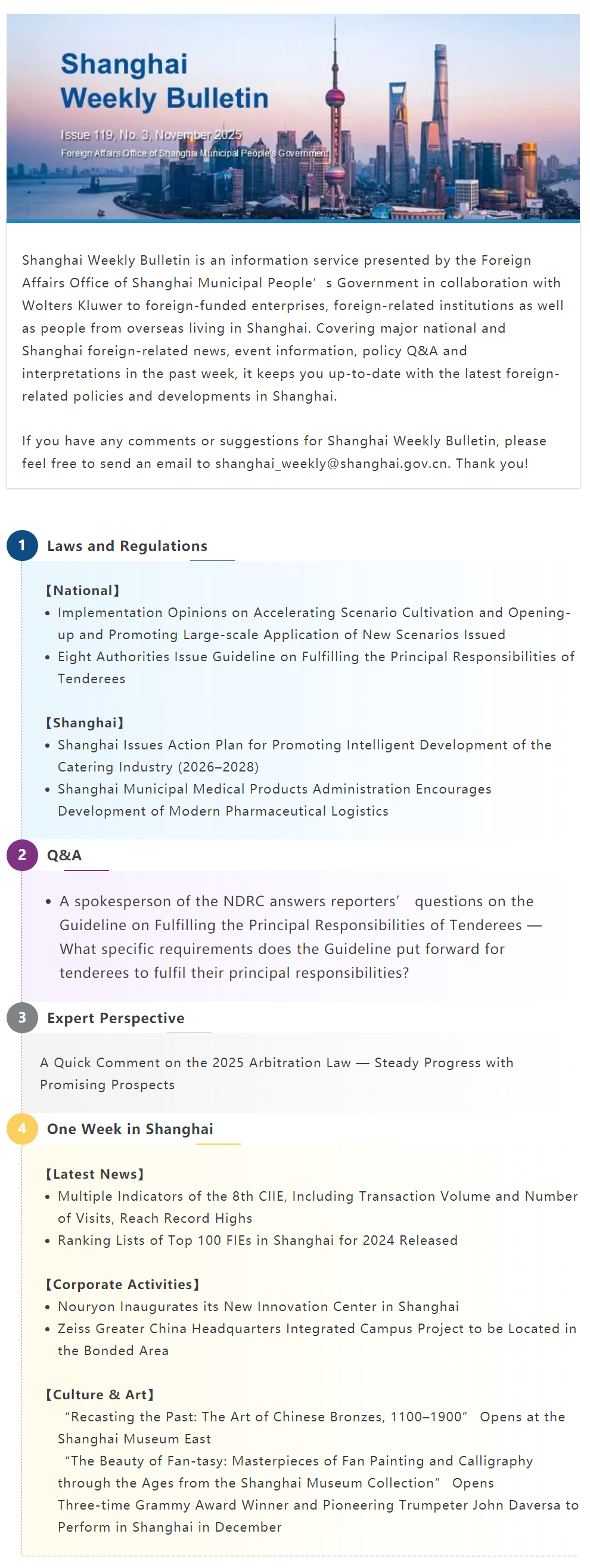Shanghai Weekly Bulletin (Issue 119 No.3, November 2025) ( 2025.11.19 )

Laws and Regulations
National
1. Implementation Opinions on Accelerating Scenario Cultivation and Opening-up and Promoting Large-scale Application of New Scenarios Issued
[Keywords: Scenario development, Scenario application]
Recently, the General Office of the State Council issued the Implementation Opinions on Accelerating Scenario Cultivation and Opening-up and Promoting Large-scale Application of New Scenarios. The document focuses on five areas, namely, developing application scenarios in emerging fields and new tracks, building new business model application scenarios for industrial transformation and upgrading, introducing a series of application scenarios in key industries, innovating comprehensive application scenarios for social governance and public services, and enriching application scenarios in the livelihood sector. The document identifies 22 priority areas for scenario cultivation and opening-up.
Source: Website of the Chinese Government
2. Eight Authorities Issue Guideline on Fulfilling the Principal Responsibilities of Tenderees
[Keywords: Tenderee, Principal responsibilities]
Recently, the National Development and Reform Commission (NDRC) and seven other authorities jointly issued the Guideline on Fulfilling the Principal Responsibilities of Tenderees. Taking a full-cycle management approach to tendering and bidding, the document focuses on six key stages, namely, preparatory work prior to tendering, tendering and bidding, organization of bid opening and evaluation, determination of bid winners, contract performance management, and supervision and administration. It sets out in detail how tenderees should fulfil their principal responsibilities at each stage and emphasizes that tenderees are responsible for ensuring the scientific validity, lawfulness and integrity of tendering and bidding activities. The document will come into effect on 1 January 2026.
Source: NDRC
Shanghai
1. Shanghai Issues Action Plan for Promoting Intelligent Development of the Catering Industry (2026–2028)
[Keywords: Catering industry, Intelligent development]
Recently, the Shanghai Municipal Commission of Commerce and four other authorities issued the Action Plan of Shanghai for Promoting Intelligent Development of the Catering Industry (2026–2028). The document calls for vigorous efforts to promote the transformation and upgrading of Shanghai’s catering industry and to enhance the international influence of Shanghai as a world gastronomy capital. By the end of 2028, Shanghai aims to build a nationally leading and world class hub for intelligent catering.
Source: Shanghai Municipal Commission of Commerce
https://sww.sh.gov.cn/zwgkgfqtzcwj/20251111/dcc46910d2c148e9afb5ee39e89cbce8.html
2. Shanghai Municipal Medical Products Administration Encourages Development of Modern Pharmaceutical Logistics
[Keywords: Pharmaceuticals, Modern logistics]
Recently, the Shanghai Municipal Medical Products Administration issued the Guiding Opinions on Modern Pharmaceutical Logistics in Shanghai. The document applies to newly-established pharmaceutical wholesale enterprises and those wholesale enterprises engaged in entrusted storage and transportation of pharmaceuticals, and encourages such enterprises to develop modern pharmaceutical logistics. The document has been implemented since 7 November 2025 and will remain in force for five years until 6 November 2030.
Source: Shanghai Municipal Medical Products Administration
https://yjj.sh.gov.cn/zx-yp/20251111/4c10636f292a4d6c9dbbebd06c83a7d8.html
Q&A
A spokesperson of the NDRC answers reporters’ questions on the Guideline on Fulfilling the Principal Responsibilities of Tenderees
Q
What specific requirements does the Guideline put forward for tenderees to fulfil their principal responsibilities?
A
The Guideline addresses prominent issues raised in practice and sets out specific provisions aimed at reinforcing and implementing the principal responsibilities of tenderees.
First, tenderees are required to conduct tendering in a scientific and reasonable manner. For projects that adopt tendering, a compliance review mechanism for tender documents shall be established to ensure that the documents are lawful, compliant, reasonable and aligned with actual needs. Criteria and procedures for identifying and handling abnormal prices shall be established with reference to market competition conditions to prevent vicious price competition. Tenderees shall prudently nominate representatives to participate in pre-qualification and bid evaluation and shall conduct verification of candidates for successful bids in a standardized manner. The use of centralized tendering and similar approaches is encouraged to improve efficiency. For procurement projects that are not legally required to undergo tendering, the decision on whether to tender should be made scientifically by taking into account a project’s technical characteristics, historical transactions of similar projects, and market competition among potential bidders, as well as the costs, efficiency, and benefits of tendering. Projects involving state secrets, emergency needs, proprietary technologies or subcontracting works are not subject to tendering in accordance with the law.
Second, tenderees are required to exercise their statutory rights in a regulated manner. The Guideline reinforces the responsibility of tenderees to resist and rectify irregularities. With regard to tenderers, tenderees may set criteria for the verification of abnormal bids, and the bid evaluation committee shall reject abnormal bids in accordance with the law. Tenderees are entitled to verify the authenticity and validity of guarantees or insurance instruments submitted by tenderers, and may refuse to return bid security to tenderers that violate mandatory legal provisions or the requirements of the tender documents. With regard to tendering agencies, tenderees shall specify in the agency contract the authority, scope of business and code of conduct of the tendering agency and its personnel, strengthen whole-process supervision of the performance of entrusted matters, and urge the tendering agency to conduct business in accordance with laws and regulations. With regard to bid evaluation experts, tenderees shall, through representatives’ reports and correction of any illegal activities by the bid evaluation experts, strengthen the review of bid evaluation reports, and hold experts who have engaged in illegal activities liable for compensation.
Third, tenderees are required to strengthen internal management. Tenderees shall establish management mechanisms covering research and decision making on tendering matters, compliance review, supervision and rectification, performance evaluation and risk prevention. They shall implement systems for registering and reporting improper intervention and strengthen the management of internal units. They shall also record and maintain traceable documentation throughout the entire bid determination process and enhance the fairness review of bid award results. In addition, tenderees shall strengthen the preservation of archives and carry out post tender evaluations on a regular basis. They shall proactively accept supervision by publishing tender plans, disclosing tender documents in advance and handling objections and complaints in a standardized manner. The fulfilment of tenderees’ principal responsibilities will also constitute an important part of the supervision exercised by their competent superior authorities.
Source: NDRC
https://www.ndrc.gov.cn/xxgk/jd/jd/202511/t20251111_1401540.html
Expert Perspective
A Quick Comment on the 2025 Arbitration Law — Steady Progress with Promising Prospects
By He Junming (Shanghai United Law Firm)
[Continued from the Previous Issue]
IV. Active Improvement of Technological Level of China’s Commercial Arbitration
1. Online arbitration and offline arbitration enjoy equal status and effect
Article 11 of the 2025 Arbitration Law expressly confers the same legal effect on online arbitration as on offline arbitration, thereby putting an end to previous debates over whether an arbitral tribunal could hold hearings online. This revision reflects the technological advancement in arbitration and also represents a summary and refinement of China’s existing experience in bringing the court system and arbitral institutions onto cloud-based platforms.
For example, in relation to the court system, the People’s Court Online Services Platform (https://zxfw.court.gov.cn) launched in 2022 integrates nationally applicable litigation service functions such as mediation, online access to case files, service of process, preservation measures, and authentication, as well as specialized service functions offered by some local courts. By conducting litigation online, the average number of trips parties need to make to the court has been reduced from nearly six to only one to two, and in some cases, they do not need to attend the court in person at all.
In relation to arbitral institutions, bodies such as the Shenzhen Court of International Arbitration, the Shanghai Arbitration Commission and the Shanghai International Economic and Trade Arbitration Commission have launched a number of intelligent cloud platforms, including the SCIA Smart Arbitration, the ACCSH Smart Arbitration and the SHIAC E-Platform. They have accumulated extensive experience in conducting hearings fully online as well as in hybrid formats that combine online and offline elements.
2. Repeated emphasis on the importance of sci-tech talent for the development of commercial arbitration
Articles 18 and 22 of the 2025 Arbitration Law add provisions on sci-tech talent specifically regarding the composition of arbitral institutions and the criteria for the appointment of arbitrators. This fully reflects China’s intention to increase the proportion of sci-tech talent in the commercial arbitration sector.
The underlying consideration is that advanced technologies such as AI are rapidly changing and reshaping the arbitration industry. In China and abroad, an increasing number of arbitration practitioners are choosing to actively embrace these technologies in order to improve the quality and efficiency of their services. For example, the first domestic arbitration Q&A robot “3i”, jointly developed by the Shenzhen Court of International Arbitration (SCIA) and Legal Lab, has already answered a large number of professional arbitration questions for arbitrators, lawyers, parties and case handlers, and attracted wide attention and high recognition across the sector. In another example, the American Arbitration Association provides various AI tools on its official website, covering the whole process from drafting dispute resolution clauses to delivering arbitral awards, which has generated significant interest and trial use within the profession.
With the implementation of the 2025 Arbitration Law and the further advance of science and technology, it is expected that more Chinese arbitral institutions will choose to actively embrace advanced technologies and harness them to support the development of commercial arbitration in China.
One Week in Shanghai
Latest News
1. Multiple Indicators of the 8th CIIE, Including Transaction Volume and Number of Visits, Reach Record Highs
[Keyword: CIIE]
The 8th China International Import Expo (CIIE) concluded successfully on 10 November. This year’s CIIE featured 43 trade groups and more than 700 sub-groups, with over 460,000 registered visitors, an increase of 7 % year on year. The CIIE saw robust transaction activities, with the intended deal value reaching US$ 83.49 billion on an annual basis, up 4.4% from the previous session and setting a new record.
Source: International Services Shanghai
https://english.shanghai.gov.cn/en-CIIE2025Latest/20251110/6250caa0eb7a48cfa5d4051bd695e60f.html
2. Ranking Lists of Top 100 FIEs in Shanghai for 2024 Released
[Keywords: Foreign investment, Top 100]
Recently, the 2025 Presentation Ceremony of Top 100 FIEs in Shanghai was held. In 2024, a total of 265 foreign-invested enterprises made it onto the Top 100 FIEs Lists across the four categories, namely, business revenue, total import-export volume, tax contribution, and job creation.
Source: Shanghai Foreign Investment Association, Ranking Lists
Corporate Activities
1. Nouryon Inaugurates its New Innovation Center in Shanghai
[Keyword: Nouryon]
Recently, Nouryon announced the official inauguration of its latest innovation center in Shanghai. The center is equipped with state-of-the-art facilities and comprises eight specialized laboratories, including new laboratories dedicated to providing technical support for the company’s industry-leading products. A major highlight of the new center is the customer experience center designed for the personal care sector.
Source: Nouryon
2. Zeiss Greater China Headquarters Integrated Campus Project to be Located in the Bonded Area
[Keywords: Zeiss]
Recently, at the 8th CIIE, Carl Zeiss IMT (Shanghai) Co., Ltd and the Bonded Area Administrative Bureau under the Administrative Committee of the China (Shanghai) Pilot Free Trade Zone formally signed the land use rights transfer agreement. This marks an important milestone for the Zeiss Greater China Headquarters integrated campus project, which will now move into the construction phase.
Source: Zeiss
Culture & Art
1. “Recasting the Past: The Art of Chinese Bronzes, 1100–1900” Opens at the Shanghai Museum East
[Keywords: Qing dynasty bronzes]

On 11 November, the special exhibition “Recasting the Past: The Art of Chinese Bronzes, 1100–1900”, jointly organized by the Shanghai Museum and the Metropolitan Museum of Art in New York, officially opened. The exhibition features about 178 pieces or sets of exhibits drawn from the Shanghai Museum’s collection of bronze wares from the Song, Yuan, Ming and Qing dynasties. In collaboration with the Metropolitan Museum of Art, the exhibition also brings together important collections from Asia, Europe and the Americas, complemented by paintings, ceramics and enamel wares from the same periods. With a number of works being unveiled to the public for the first time, the show stands as one of the largest displays of bronze wares from the Song, Yuan, Ming and Qing dynasties presented domestically and internationally in recent years. The exhibition will run until 16 March 2026.
Source: International Services Shanghai
https://english.shanghai.gov.cn/en-ArtExhibitions/20251112/caeb4c01d1e04bab98a1b1a9052941a1.html
2. “The Beauty of Fan-tasy: Masterpieces of Fan Painting and Calligraphy through the Ages from the Shanghai Museum Collection” Opens
[Keywords: Fan paintings and calligraphy]

On 14 November, the exhibition “The Beauty of Fan-tasy: Masterpieces of Fan Painting and Calligraphy through the Ages from the Shanghai Museum Collection” opened at the Shanghai Museum on People’s Square, No.1 Exhibition Hall. The exhibition traces the evolution of fan painting and calligraphy and selects 100 masterpieces from the Museum’s collection, spanning the Song, Yuan, Ming and Qing dynasties as well as the modern period.
Source: Shanghai Museum
3. Three-time Grammy Award Winner and Pioneering Trumpeter John Daversa to Perform in Shanghai in December
[Keywords: John Daversa]

On 7 December, three-time Grammy Award winner and pioneering trumpeter John Daversa will take the stage in Shanghai together with the Shanghai Conservatory of Music Jazz Orchestra, one of China’s leading jazz ensembles, to present a spectacular programme that has won wide acclaim and numerous awards.
Source: Shanghai Tourism